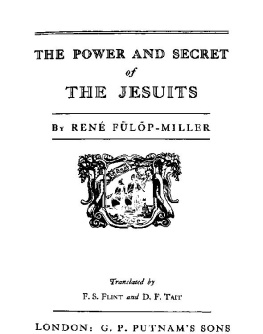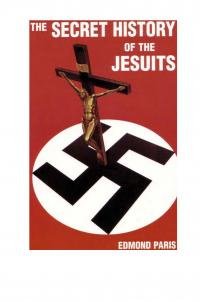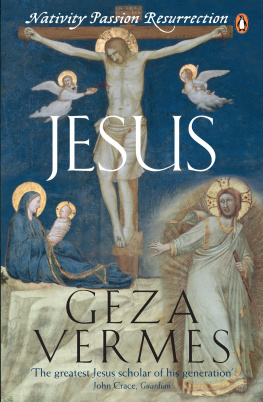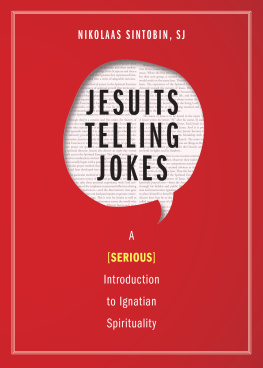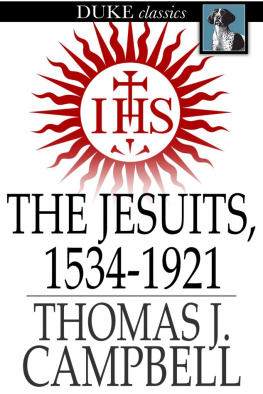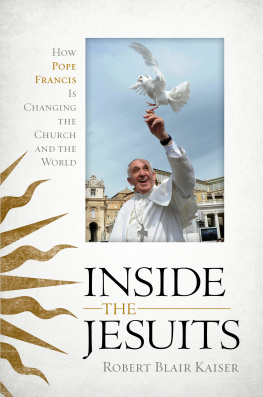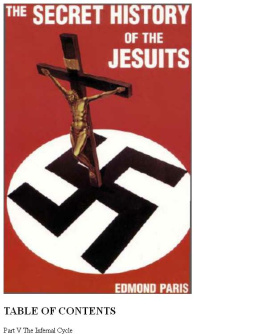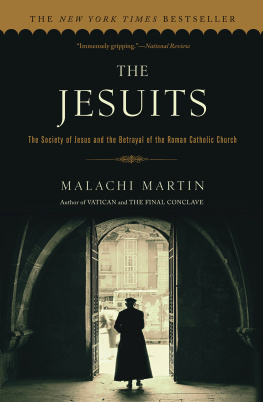FIRST PUBLISHED IN 1930
Printed in U. S. A.
NEVER before in the course of the worlds history had such a Society appeared. The old Roman Senate itself did not lay schemes for world domination with greater certainty of success. Never had the carrying out of a greater idea been considered with greater understanding. For all time this Society will be an example to every society which feels an organic longing for infinite extension and eternal durationbut it will also be a witness to the fact that unregarded Time alone brings to naught the cleverest undertakings, and that the natural growth of the whole race inevitably suppresses the artificial growth of a part.
NOVALIS.
PREFACE
WRITINGS concerning the Society of Jesus may be numbered by thousands; from the foundation of the order to the present day, every epoch, and almost every people and every tongue, has produced an extensive literature relating to the Jesuits. Of all these works, few indeed attempt to treat the subject objectively, while the remainder are all concerned either with reviling and accusing or with praising and defending.
Nevertheless, anyone who in our days seeks the truth about Jesuitism will find more valuable help in these partisan, controversial writings than in the guaranteed information of the historians. For, however important in many respects verified data and documents may be, such dry compilations never reveal to us the whole, or, indeed, the most essential part, of the truth. Incomparably deeper insight into the being and the meaning of Jesuitism is afforded by all the hate-filled pamphlets, the highly coloured apologies, distorted representations, doctored reports, the slanderings and glorifications of the orders history. They show us the attitude of living men to the Jesuit idea, disclose how deeply this idea has influenced emotions, thoughts and actions at every period, to what a passionate degree of rage and enthusiasm it has driven the mind of man.
In these writings, we see the combatants in the midst of the conflict, accusing or conciliatory, arrogant or humble, entreating or triumphing, cunning or open-hearted; we hear the cadence of their speech, see their actions and their plottings. In consequence, the judgment to which such controversial literature leads us is not derived from colourless, historical material, reduced to dry data, but grows from the evidence of living witnesses and from direct observation.
The author, therefore, could scarcely have wished for more valuable or suggestive material relating to his subject than that which is to hand. It introduces us to the salons of Paris society, the observatories of great astronomers, the primeval forests of South America, the ceremonial halls of China, the palace of the Sacrum Officium, the lodges of the Freemasons, into churches, conspirators conventicles and hermits cells; we pass through every town and country of the inhabited earth, through every epoch of recent times. We find ourselves involved in theological, philosophical, scientific, political, sociological and literary controversies until we at last realize that the four hundred years we have explored are the most significant in the development and culture of modern humanity and are filled with its most decisive problems.
The present volume, therefore, does not profess to be the contribution of a professional historian to the history of the Jesuit order, so much as a picture of those human passions and dreams, achievements and failures, which have decided our modern culture, and a picture no less of those factors of cunning, infamy, heroism, intrigue, power of persuasion, despotism, sagacity and deception which have played their part in shaping the present.
For this reason, the method of presentation of the professional historians, with its esoteric language, its impartial dryness and objectivity, for the sake of which the stupid and the wise, the sublime and the ridiculous are treated with equal respect, seemed unsuitable to the authors purpose.
In the authors opinion, subjective appraisement, enthusiastic affirmation and denial, awe-struck reverence, indulgent humour and malicious mockery, as the subject at the moment demands, are no less valid means of representation than the objectivity of impersonal relation. It seems to him that the striving after true understanding should never compel a limitation of the means of expression, that, on the contrary, every conceivable faculty should be called into play, if the truth is to be rendered even approximately.
The author here wishes to express his sincerest and most heartfelt thanks especially to his esteemed friend, Mr. Johannes von Guenther, literary editor of the German publishers, for encouraging him to do justice to the problems of Catholicism in a modern study and for the sympathy and understanding that were always forthcoming for the author and his work. He also thanks all those persons, authorities and societies whose help has been of the utmost value to him in his travels and in the collection of the documentary and illustrative material required; here it should be remarked that Jesuits and other Catholic groups, as well as their opponents, Protestants, Socialists and Freemasons, have placed their services at his disposal in the most amicable way.
In Spain, the author has had the help of Mr. M. Velasco y Aguirre, Curator of the Department of Prints-and Engravings of Madrid, Mr. F. de P. Amat, General Secretary of the University, of the editors of Razon y Fe Father Z. G. Villada, Mr. G. Fernandez-Shaw, Mr. E. Lucas,
Professor M. G. Morente, Professor Don Anizeto Sardo y Villar and of Mr. M. Ullmann in Madrid, of Fathers P. Pastells and J. Villar at Manresa, J. M. de Estefania and L. Frias at Loyola, Father A. Tobella of the Benedictine Abbey of Montserrat, Mr. J. de Urquito, President of the Basque Society at San Sebastian, Dr. Rubio of the Catalonian Library at Barcelona, of the eminent authority on Loyola, Father J. Creixel, and of Mr. C. B. Plata, Director of Indian Archives at Seville.
The authors thanks are likewise due to Messrs. A. Babelon, A. Lin*zeler and M. Aubry of the Bibliotheque Nationale in Paris, Professor J. Baruzzi and Mr. M. Bonnerot of the Sorbonne, Mr. F. Calot of the Ste. Genevieve Library, Mr. F. Boucher of the Carnavalet Museum, Mrs. Horn and Mr. Rondel of the Arsenal Library, the editor-in-chief of Etudes, Father Dudon, and to Fathers Chambeau and Rouet in Paris.
Their support in the work has also been given by Fathers P. Tacchi-Venturi, C. Bricarelli, F. Busnelli and E. Rosa, Professor A. Petrucci, of the Department of Prints and Engravings at the Palazzo Corsini, Professor F. X. Zimmerman, Professor Galassi-Paluzzi, Fathers Schulien and Schmidt, the directors of the Lateran Mission Exhibition, and Dr. J. Jorda of the Austrian Embassy at the Quirinal.
The authors grateful thanks are also due to Dr. Joseph Gregor, the famous historian of dramatic art and director of the dramatic section of the National Library at Vienna, for rare works and engravings, to Mr. Franz Hanaczek, the director of Herder and Co. of Vienna and to Dr. Hermann Leber of Munich for valuable references. In procuring the necessary photographic reproductions, help has been given by Messrs. Vaule in Paris, Lagos in Madrid, Sarda at Manresa, Korty in Vienna, and Alinari, Calderisi and San Saini in Rome.
Finally, special thanks are due to Mr. Percy Eckstein, the authors friend, who has given him the most valuable assistance in this work.
Rene Fulop-Miller.
Vienna. August, 1929.
CONTENTS
ILLUSTRATIONS
Frontispiece: Ignatius Loyola
1. Examen particulare
2. Examination of the conscience

